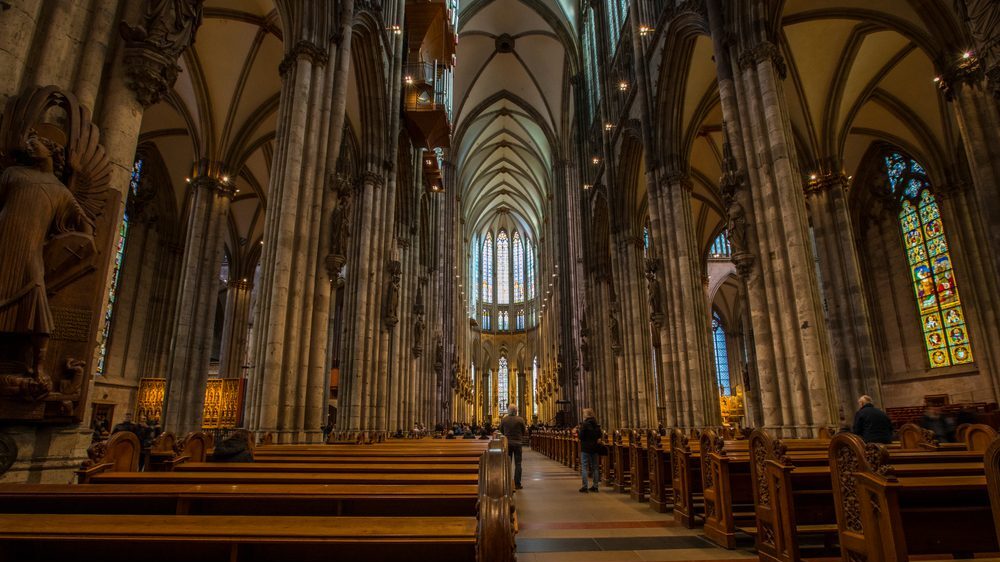
Cologne Cathedral, interior.
Photo: chrisdorney / Shutterstock.com
Church attendance across Europe has declined in recent decades and the Roman Catholic church is no exception to the trend. A 2021 report from the Forschungsgruppe Weltanschauungen in Deutschland (fowid) claimed that just 4.3% of Catholics in the country report attending Mass regularly, though the range differed between 2.4% and 10.3% in different dioceses.
Many German Roman Catholics, despite not attending Mass regularly, are still registered as members of the Church and pay the German Church Tax—but that too is changing as a new report from the newspaper Die Welt claims that a record 522,821 people have chosen to renounce their faith and leave the church.
When deaths are taken into consideration, the German Catholic Church lost a total of 708,000 members and saw just 155,173 baptisms and 1,447 new members in 2022.
While the Catholic church remains the largest single religious denomination in Germany with around 21 million members or 24.8% of the German population, the number of departures in 2022 was double that of 2020 and a 2021 report found that as many as one in three Catholics were considering leaving the church.
The reasons for the departures are multifaceted and varied as the German church has faced multiple scandals in recent years, including sexual abuse scandals, which the 2021 study found as a major motivation for those expressing a desire to renounce their faith.
Younger people, however, are said to be more concerned with paying the Church Tax, a mandatory tax for members of established churches which can only be opted out of by renouncing the faith and thereby being excommunicated.
“The Catholic Church is dying an agonizing death in front of the eyes of the social public,” Catholic canon lawyer Thomas Schüller said.
According to Die Welt, a report released in January on the topic of abuse in the Archdiocese of Munich and Freising and allegations of complicity of former Pope Benedict XVI has also led to a surge in those leaving the Church.
Cologne Cardinal Rainer Maria Woelki, the head of Germany’s richest and largest diocese, is the latest to face allegations by secular authorities. He is currently under investigation for perjury as some claim he gave false witness regarding how much he knew about sexual abuse in the diocese.
Earlier this week, on Tuesday, June 27th, German police in Cologne launched raids of six properties owned by the Archdiocese of Cologne as part of the investigation into Cardinal Woelki, including the house occupied by the Cardinal.
“Experience has shown that it will take a long time before the result is available. Untilthen, we ask the public not to take an open-ended investigation as an opportunity to pronounce prejudgements,” the Archdiocese said in a statement, confirming the raids occurred.
Munich Vicar General Christoph Klingan told the newspaper Bild that sexual abuse was likely a large factor in the number of people leaving the church, which he called “worrying,” and stated, “Many people are turning their backs on the Church, and quite a few cite the cases of sexual abuse in recent decades and the inadequate handling of it as the reason.”
The German Catholic church is one of the wealthiest in the world due in large part to the Church Tax, with the church receiving as much as €6.73 billion from the Church Tax in 2021, the second-highest figure ever recorded. It has been suggested that the Archdiocese of Cologne alone has more money in assets than the Vatican.
The German church has also been a powerful, yet divisive, voice within the Church as many have slammed the recent Synodal Weg (Synodal Way) conference that has suggested radical reforms to the church, including opening up the priesthood to women, allowing women to become deacons, and calling for priestly celibacy to be optional.
The conference was particularly criticised by a German initiative called “New Beginning” which called on Bishops from across the globe to protest the Synodal Weg and not ignore it saying, “The next schism in Christendom is just around the corner. And it will come again from Germany.”
The Vatican has also not endorsed the Synodal Weg conference, with Cardinal Marc Ouellet, prefect of the Dicastery for Bishops, and Cardinal Luis Ladaria Ferrer, the prefect of the Dicastery for the Doctrine of the Faith, seriously critiquing the conference’s proposals.
While the mainstream German Catholic church has embraced radical liberal reform, a small minority of Traditionalists who celebrate the Traditional Latin Mass (TLM), the liturgy practised prior to the Vatican II Council, do exist and may be growing but no exact figures have been published regarding their number within the Church.
However, in other countries, such as the United States, the TLM and Catholic Traditionalism have been shown to be attractive to young people aged 18 to 29, with 98% of Traditional Catholics attending Mass at least once a week, compared to just a quarter of Catholics in that age bracket overall.
